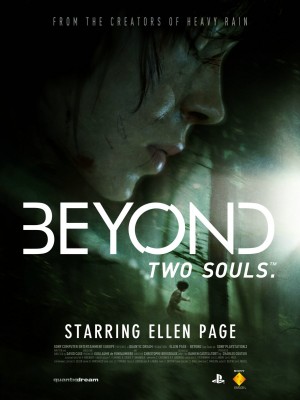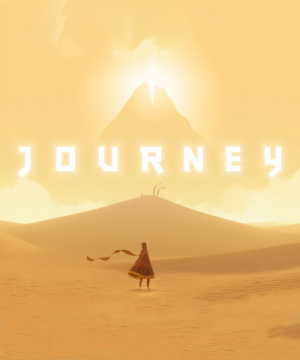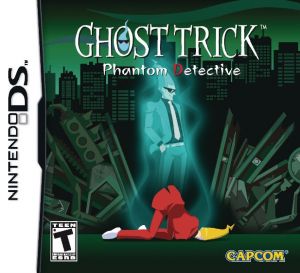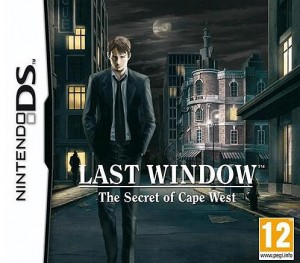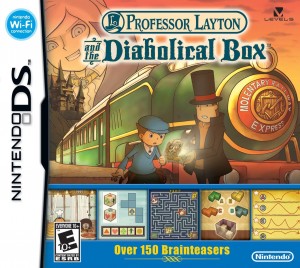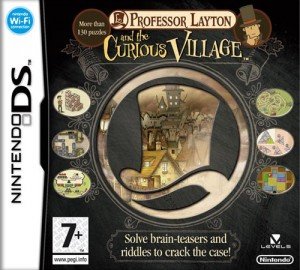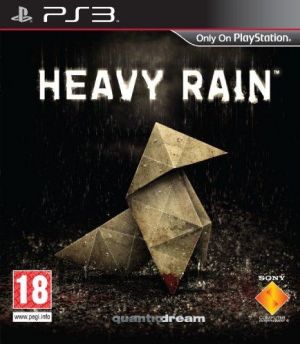Best Console/Handheld Adventure (retired)Aggie Award Winners

The home console and handheld platforms haven’t quite championed a genre resurgence like we once hoped they might, but there were still several quality titles released in the past year. To avoid duplication, the following includes only those games exclusive to non-PC platforms. Ports are not deemed to be original releases, and are therefore ineligible.
» Aggie Awards - category overview
The Aggie award winners:
Professor Layton vs. Phoenix Wright: Ace Attorney (2014 winner)
Professor Layton vs. Phoenix Wright: Ace Attorney
Professor Layton and Phoenix Wright are legends among handheld adventure game protagonists. Both the top-hatted archeologist and spiky-haired defense attorney have been the stars of their own long-running, highly regarded Nintendo series, Layton laying claim to two previous awards all on his own (and Wright largely the victim of pre-dating the Aggies). So when it was announced that the two hit franchises would be getting a crossover on the 3DS, expectations were high indeed, mixed with a degree of trepidation – after all, the two series are very different in style. But while some loose ends could have been tied up better and the puzzles proved easier and less numerous than in regular installments, the extent to which the developers managed to allay those fears and meet our expectations is stunning.
The gripping tragedy of Ace Attorney cases multiplied by the sense of scale of a Layton mystery makes Professor Layton vs. Phoenix Wright the most grim adventure either have experienced, and one of the most compelling. Replacing the investigative parts of a Phoenix Wright game with Layton-style gameplay is a match made in puzzling heaven – occasional exposition dumps notwithstanding – and the developers even saw fit to freshen up the subsequent witch trials with some new game mechanics. The delightful cartoon graphics and rich animation look as good as you’d expect from either series, while the strong rhythms from Phoenix Wright and the rich instrumental palette from Professor Layton fuse to give rise to the best soundtrack of either of its series. With the main Layton series seemingly concluded and there being no guarantee of future Ace Attorney localizations outside Japan, Professor Layton vs. Phoenix Wright may be the last we have heard of either of these gentlemen for a while. But they couldn't have picked a better note to leave on, and for that they deserve our 2014 award for best exclusive console or handheld adventure.
2014 winner of:
2014 Readers Choice' winner of:
BEYOND: Two Souls (2013 winner)
The field for console and handheld exclusives wasn’t overly crowded in 2013, but the limited output was a classic case of quality over quantity. A number of releases stretched the definition of what an adventure can be, providing new experiments in story and gameplay, and our winner was the most ambitious (and certainly the most commercially successful) of the lot, Quantic Dream’s BEYOND: Two Souls. The French developer’s latest contribution for the PlayStation 3 provided not just a brilliant demonstration of the audio and visual capabilities of Sony’s console, but also what is possible by pushing the narrative envelope.
While BEYOND didn’t quite reach the heights of its predecessor, Heavy Rain, it does continue to cement Quantic’s legacy as a studio willing to defy convention in providing compelling, mature experiences. Its story is firmly rooted in science fiction, but the care the design team put into the game, as well as the talents of A-list Hollywood actors which provided the voiceovers and motion-captured performances, created a story, world, and characters that we intimately cared about. The graphical splendour of BEYOND was also a joy to behold, from thrilling action scenes in an underwater base to minute emotional details in characters’ facial expressions. Squabble over genre labels all you want, but of all the console and handheld adventures we embarked on in 2013, BEYOND: Two Souls was the most unforgettable, making it a deserving winner of this year’s Aggie Award.
2013 Readers Choice' winner of:
Following up their divisive play-as-meditation games flOw and flower with a highly-stylized game about a robed figure traversing harsh climate seemed an odd choice for developer thatgamecompany, but then again Jenova Chen and associates have never really played by the established rules. In fact, it's hard to qualify Journey as belonging to any one single genre, sharing elements with platforming, puzzlers, and arthouse indies, but ultimately it's closer to an adventure game than anything else. Really, though, it's unlike anything else you have ever played. And it's superb, easily making this PlayStation 3 exclusive our top console award winner of the year.
The first thing that grabs you is the striking visual style, full of muted browns, greens and reds alongside stark whites and impenetrable blacks. Then you hear the beautiful music that punctuates and underlines every movement and environment perfectly. Next to impress is the fluid animation, smooth as glass controls, and an atmosphere that completely sucks you in. In addition to all this, Journey includes a feature that almost melts into the background but is so ingenious you can't help but be in awe: An anonymous co-op mode where other players join your game – not to help you take down aliens or solve puzzles, but to experience the joy of making new discoveries together. Without names or exchanging a word, this shared experience connects two souls in a way no other game ever has. People can endlessly debate whether games are art, or even whether this is really a game, but with an offering such as Journey available, we'd rather spend our time playing them than talking about them.
2012 winner of:
2012 Readers Choice' winner of:
Ghost Trick: Phantom Detective (2011 winner)
When Ghost Trick: Phantom Detective released in early 2011, adventure fans may have initially objected(!) to a new game from Phoenix Wright creator Shu Takumi that didn’t take place in the courtroom, but the unusual puzzler quickly made an impression with its quirky anime graphics, unique premise, and creative gameplay. Playing as Sissel, a spikey-haired man in a bold red suit who has just met his untimely demise, players have only one night to figure out how he met with his fate before his soul ceases to exist. Since he’s dead, the only tools at his disposal are his “ghost tricks”: the ability to possess and manipulate inanimate objects, to communicate with recently dead souls, and most importantly, to briefly turn back time so he can rescue others destined for an early grave. As the hours tick by, Sissel learns more about the convoluted path that led him to this point and the people whose lives are entangled with his own, finally homing in on the answers he’s been seeking – but not without some major shockers along the way.
Most of Ghost Trick’s gameplay involves setting up chain reactions among inanimate objects, Rube Goldberg-style, so Sissel can interact with the living world, glean information about his death, and protect others in imminent danger. Easily played with the Nintendo DS’s touch screen and stylus, for the most part these sequences are practices in logic and patience, though some precise timing is also required. With stylish manga-inspired graphics and memorable characters that boast robust animations, the game makes very good use of the handheld’s relatively low specs. The well-paced story unfolds over 18 bite-sized chapters – perfect for playing in short bursts – but it’s a lengthy game overall, taking many surprising twists and an unexpectedly poignant turn near the end. Unique in many ways and thoroughly enjoyable to experience, Ghost Trick is one of the most innovative games the genre has seen in quite some time, and it needed to be to fend off some tough competition for this year’s “Best Console/Handheld Adventure” award.
2011 winner of:
2011 Readers Choice' winner of:
Last Window: The Secret of Cape West (2010 winner)
Interactive fiction is a concept that dates back to experiments like the “Choose Your Own Adventure” books, but there was nothing particularly interactive about those. Then text adventures like Zork came along and everything changed, allowing us to be active participants for the first time. The reason we love adventures in the first place is that rather than being passive spectators, we can truly influence how a story unfolds, perhaps even changing the final outcome. While other graphic adventures continue to streamline this process, perhaps even a little too much, Last Window: The Secret of Cape West stands out as the modern embodiment of interactive fiction. With the Nintendo DS held sideways in hand, it's just like holding a book. And when playing a game this good, it’s easy to lose yourself in its page-turning fictional world.
The sequel to Hotel Dusk: Room 215 is a deeply engrossing, highly immersive, and fully interactive noir mystery, filled to the brim with fascinating characters to interrogate, like a contemporary Sam Spade or Philip Marlowe. The game plays smoothly, its investigative segments feel natural, and its well-honed exploration allows us to be the protagonist, acting as Kyle Hyde’s eyes and hands. All the while, the DS-centric puzzles make excellent use of the handheld’s capabilities, making the experience all the more personally engaging. Even the way we hold the console, the way we handle it, becomes an interactive opportunity. Point-and-click? Pffft. So much wasted potential. Competing against the heavily-hyped, big-budget Heavy Rain made Last Window: The Secret of Cape West a decided underdog for this category, but it ultimately provided a better-rounded gameplay experience. As such, Cing's swan song has earned the distinction of not only being the best console adventure of 2010, but one of the finest examples of interactive fiction ever made.
2010 winner of:
2010 Readers Choice' winner of:
- No awards won
Professor Layton and the Diabolical Box (2009 winner)
Five years after its release, the Nintendo DS is still the most prolific non-PC platform for the genre. And it’s no mystery why. While maintaining a familiar point-and-click interface (albeit with a stylus in hand instead of a mouse), the unique little handheld device allows players to comfortably lounge in their favorite chairs or fit a little gaming in while on the go. And with its limited hardware, the DS lends itself perfectly to titles that emphasize gameplay over technology. In the right developer hands, the result can be a picturesque adventure full of odd characters and mind-blowing puzzles, enriched by a stunning visual presentation that seems to stem from a Miyazaki movie. Sound familiar?
Yes, for the second year in a row, a Professor Layton adventure wins our Best Console/Handheld category hands-down, so the eccentric archeologist and puzzle-solver extraordinaire can now proudly add a second Aggie to his award showcase. Thanks to its charming atmosphere, a cast of whimsical characters, and especially its vast collection of brain-teasing conundrums, Professor Layton and the Diabolical Box is a must-play for fans of puzzle-driven games. Though the story is undeniably thin, the quirky tale of Pandora's Box, the whimsically compelling mystery of the Molentary Express, and the quaint ambiance of the villages scattered alongside its course provide an endearing backdrop for Layton and Luke's escapades. Add to this a lovely graphic design, catchy soundtrack, and tons of wonderfully animated cutscenes, and it’s clear why every player is in for a delightful experience that can warm the heart while challenging the little grey cells like few other games can, regardless of genre or platform.
2009 winner of:
2009 Readers Choice' winner of:
Professor Layton and the Curious Village (2008 winner)
While home consoles showed brief flashes of promise for their adventure gaming potential in 2008, the DS once again proved to be the go-to system for non-PC adventures with some impressive new titles, and tops on that list was Professor Layton and the Curious Village. Many will argue that it's more puzzle collection than full-fledged adventure, but few deny that it's one of the most stylish and addictive titles of any genre on Nintendo's handheld, filled with clever riddles, bizarre characters, and ridiculously polished presentation.
While its story framework may be thin, that won't stop you from wanting to see the murder mystery facing the top-hatted archeologist and puzzle-solver extraordinaire through to the end, slowly uncovering the deceptively dark secrets of the peculiar town of St. Mystere. Along the way, oh what a collection of puzzles you will indeed encounter. The game's many riddles always challenge, but in a completely fair, I-can-do-this kind of way. Better still, along with those trying brainteasers come ample rewards: bonuses and rewards colour your adventure, giving you different perspectives to the puzzles you encounter. This is the kind of game that'll keep you up at night trying to solve "just one more" puzzle, only to find the next story segment drawing you further along once again.
2008 winner of:
2008 Readers Choice' winner of:
Readers Choice' Award winners:
Professor Layton vs. Phoenix Wright: Ace Attorney (2014 winner)
Professor Layton vs. Phoenix Wright: Ace Attorney
By far the biggest winner in this category was “No answer”, earning a whopping 79 more votes than its next-highest competitor. This goes to show that adventure gamers are still largely a PC/Mac-centric group. But of those that were nominated, this was also the most competitive category of all. We say it every year, and it happened once again: Professor Layton vs. Phoenix Wright won the reader award by one vote! Even with two cracks at it, the Danganronpa series wasn’t quite able to top the star-studded lineup in Nintendo’s 3DS crossover adventure.
BEYOND: Two Souls (2013 winner)
The PlayStation 3 may not have a lot of adventures, but it is the exclusive platform for Quantic Dream’s interactive dramas (much to the chagrin of PC gamers worldwide). Three years after Heavy Rain won similar Aggie honours, now BEYOND: Two Souls follows suit as the top console exclusive, convincingly trouncing its closest handheld competitors.
Another title sure to spark plenty of "is it an adventure?" and even "is it a game?" debates, Journey is incredible, and on that we agree. It's a stylishly beautiful, melancholy exploration in which the "journey" is far more important than the destination, and even better when shared with an anonymous multiplayer partner. It's a shame that it's available solely on PS3, but for those with access to Sony's home console and don't mind some gentle platforming elements, it's a must-play experience.
Ghost Trick: Phantom Detective (2011 winner)
The clear winner of the reader poll was really “no answer”, proving once again that adventure gamers are an overwhelmingly PC-centric lot. But among those who have branched out into other platforms, the unique new adventure by Shu Takumi proved just as popular as its Ace Attorney predecessors in taking home the best console or handheld adventure award, handily topping an impressive pair of challengers in 2011.
Heavy Rain (2010 winner)
Many people lament and even resent the fact that Heavy Rain is a console-only exclusive. But there’s no doubt that Sony and Quantic Dream achieved their goal of presenting a highly cinematic interactive drama. Its gritty premise, multi-character narrative arc, organic control scheme, and of course an impressive amount of freedom to control the storyline all added up to one of the most memorable adventure experiences of the year, regardless of platform.
Professor Layton and the Diabolical Box (2009 winner)
Apparently we’re all suckers for a good puzzle. Or if not just one, then for a mind-boggling (and not for the last time) 150-plus puzzles in the stylish Professor Layton and the Diabolical Box. Sure it may be more a puzzle game than fully-integrated adventure, but the Professor’s second title is the sort of challenging, just-one-more experience that makes people consider buying a Nintendo DS all on its own.
Professor Layton and the Curious Village (2008 winner)
See? We told you few would deny how good Professor Layton is, although the supporters of Apollo Justice: Ace Attorney and Strong Bad made a worthy but ultimately futile effort to keep the puzzle-centric DS adventure from top spot. But just as every puzzle has an answer, so every reader poll has one too, and to this choice of the winner we can only declare: CORRECT!





